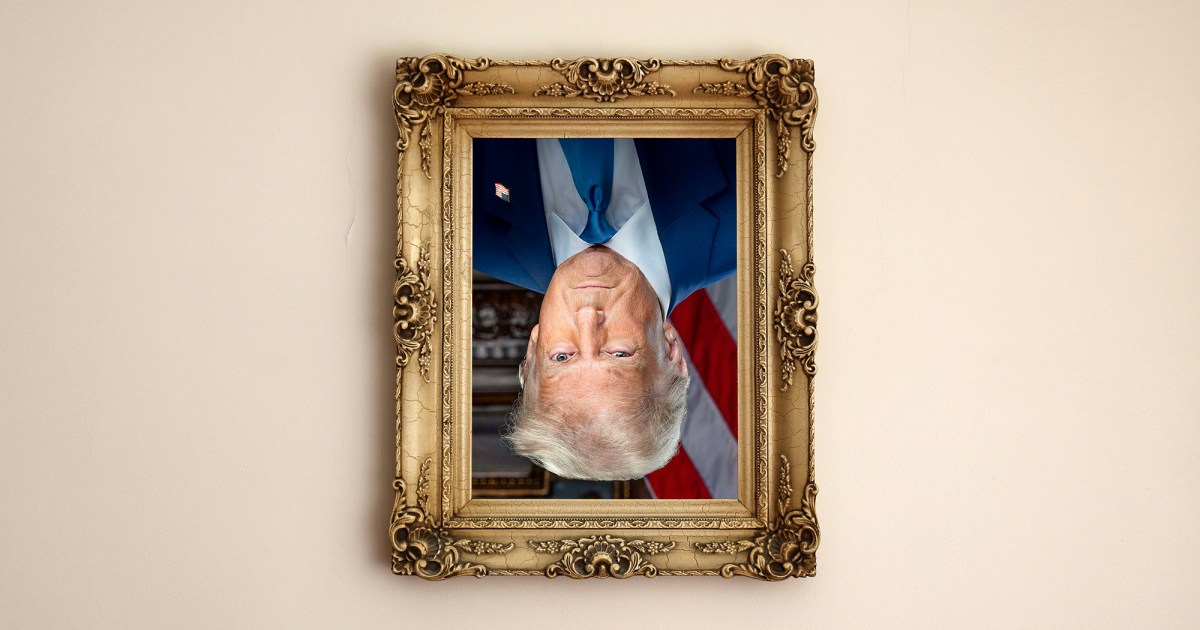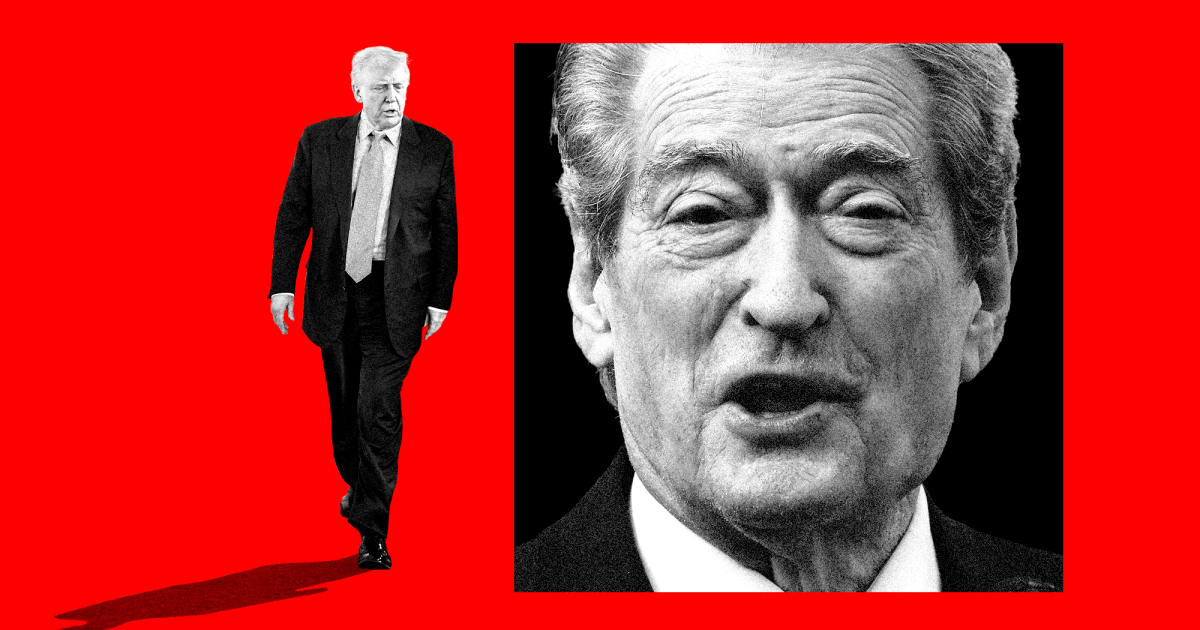What will you remember about Donald Trump’s second first 100 days? Probably the cruelty and arrogance of the people in charge, and the fecklessness of so many institutions that were supposed to fight back. Maybe the image of the world’s richest men, and some of their wives, sitting obediently in front of the president’s cabinet on Inauguration Day. Or the way the New York Times described Elon Musk as having “extended his arm diagonally upward, palm facing down.” Or the enthusiasm with which the Secretary of Agriculture encouraged Americans to raise chickens. Or the words, “They hate our beef because our beef is beautiful and theirs is weak.”
But personally, I’m going to remember all the mistakes.
I have never seen a government get so many things wrong, in so many different ways. It was like an Obamacare website every 18 hours. It was like the soft opening of Jurassic Park. And these were not the sort of run-of-the-mill snafus that are endemic to any large organization. They all had something in common: People who thought they knew better than everyone else took on work they didn’t understand, and sidelined the people who did. They were making mistakes, quite simply, because the people who didn’t make mistakes were gone, and because there was no one left to tell them not to, or to correct them when they did.
In 100 days the administration has, in no particular order:
- “Accidentally cancelled,” in Musk’s words, funding for “Ebola prevention.”
- Sent Harvard an “unauthorized” list of demands, which led the nation’s wealthiest university to stop negotiating with the administration and fight back in the courts.
- Rescinded job offers for the Veterans Crisis Line, “due to an administrative error.”
- Fired Health and Human Services employees that, according to Health and Human Services Secretary Robert F. Kennedy Jr., “should not have been cut.”
- Accidentally fired, and tried to rehire, employees at the National Animal Health Laboratory Network who were working on the administration’s response to bird flu.
- Fired, and scrambled to rehire, people responsible for maintaining the nation’s nuclear weapons stockpile.
- Fired, and then un-fired, workers at the Environmental Protection Agency.
- Fired, and then rehired, people responsible for ensuring the safety of medical devices.
- Fired workers at the Small Business Administration, then un-fired them, and then fired them again.
- Accidentally fired people who had already taken a buyout offer.
- Tried to fire 22 US attorneys, but sent the termination emails to the wrong addresses.
- “Mistakenly” gave the “normalize Indian hate” guy the power to rewrite Treasury payment systems.
- Accidentally published classified information about the National Reconnaissance Office.
- Accidentally outed the CIA’s station chief in Kabul.
- Shared an unclassified list of new CIA employees via email.
- Tried to sell a government complex that includes a secret CIA facility.
- Inadvertently put both the Justice Department and the FBI headquarters up for sale.
- Accidentally made Brian Driscoll (aka “Drizz”) acting director of the FBI and then just went with it rather than acknowledge the mixup.
- Accidentally revealed living peoples’ Social Security numbers as part of their big dump of JFK assassination files, after Trump ordered the documents released with 24 hours notice.
- Accidentally cut off the ability of people in Maine to get Social Security numbers for their newborns because, according to the acting Social Security administrator, “it looked like a strange contract.”
- Accidentally made it possible for anyone to update the Doge.gov homepage, which resulted in the words “THESE ‘EXPERTS’ LEFT THEIR DATABASE OPEN” staying up on the site for 12 hours.
- Claimed $8 billion in savings on an $8 million contract.
- Completely invented a non-existent $50 million program to supply condoms to Gaza.
- Hired a new IRS chief—on Tax Day—without telling the Treasury Secretary, leading to the new IRS chief being replaced with yet another new IRS chief three days later.
- Paid $2 billion because the acting solicitor general appealed the wrong court ruling.
- Submitted an internal legal brief saying that their congestion pricing case against New York’s Metropolitan Transportation Authority is bad, as an unsealed filing in their congestion pricing case.
- Added Atlantic editor-in-chief Jeffrey Goldberg to an emoji-riddled group chat about war plans in Yemen.
- “Accidentally” terminated and then reinstated environmental grants in Michigan.
- Cut off funding to food programs “that were not meant to be cut.”
- Announced an investigation into a non-existent medical school.
- “Mistakenly” removed Jackie Robinson and Japanese-American soldiers from the Department of Defense website.
- Imposed tariffs on an island of penguins.
- Made tariffs 4 times too high because of an incorrect math equation.
- Broke, for 10 hours, the mechanism for actually collecting tariffs.
- Accidentally told an immigration attorney from Massachusetts, who is a US citizen, she had to leave the country.
- Accidentally told Ukrainian refugees they had to leave the country.
- Accidentally detained US citizens in immigration sweeps.
- Deported Kilmar Abrego Garcia to El Salvador due to an “administrative error.”
- Accidentally pronounced 82-year-old Ned Johnson of Seattle dead.
In a functioning society, many of these actions would lead to resignations and firings. But the list of people who have paid a professional price for making any of these missteps is a bit shorter; other than the Department of Justice lawyers who submitted that congestion pricing brief in court and were subsequently reassigned, it’s honestly not clear if anyone has.
It was an explicit choice to govern exactly like this, to apply the Silicon Valley mantra of “move fast and break things” to starving children and cancer research. The driving force behind all of these errors is a carelessness about the world today that stems from a disregard for how it will look tomorrow
If anything, the opposite has occurred. Rather than acknowledge its propensity for pressing random buttons just to see what happens, the administration has codified many of its mishaps as policy. (A fair number, of course, were always matters of principle merely masked as incompetence.) Sending people to prison in El Salvador without due process simply became an official White House position. The precise timing of missile strikes simply became unclassified. A tariff rate that didn’t make sense simply became the tariff rate. We’ve always been at war with the penguin islands. The “emperor has no clothes” parable has no purchase in Trump 2.0—everyone just moves along as before without pants.
That’s not just a reflection of the White House’s sense of impunity; fucking up is the governing philosophy.
“Nobody’s going to bat a thousand, so we will make mistakes, but we’ll act quickly to correct any mistakes,” Musk said in the Oval Office in February, with his son, X, sitting on his shoulders. “Elon himself has said that sometimes you do something, you make a mistake, and then you undo the mistake,” Vice President J.D. Vance said in March. “Part of the DOGE, we talked about this from the beginning, is we’re going to do 80 percent cuts, but 20 percent of those are going to have to be reinstated, because we’ll make mistakes,” Kennedy said in April. That, too, was a mistake—the 20-percent were not ultimately reinstated.
It was an explicit choice to govern exactly like this, to apply the Silicon Valley mantra of “move fast and break things” to starving children and cancer research. The driving force behind all of these errors is a carelessness about the world today that stems from a disregard for how it will look tomorrow, and a deep-seated loathing of the people who keep the lights on. On a case-by-case basis many of these were accidents. In the aggregate they constitute an ethos: a determination to break things in a way that the next person won’t be able to put back together—to shatter a way of life so thoroughly that in the future, no one will even try.















